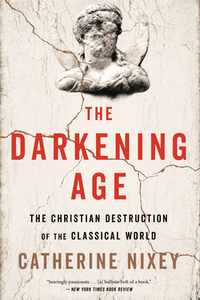Take a photo of a barcode or cover
261 reviews for:
The Darkening Age: The Christian Destruction of the Classical World
Catherine Nixey
261 reviews for:
The Darkening Age: The Christian Destruction of the Classical World
Catherine Nixey
A book as fascinating as it is infuriating.
10 half destroyed, cross marked classical statues destroyed by the religion of love out of 10
10 half destroyed, cross marked classical statues destroyed by the religion of love out of 10
I shalt make unto thee graven image and run with the old gods.
Firstly, I think I should begin by saying I am not christian. I have tried being one, I have prayed to the christian god before, but he never answered. I even attempted reading the bible. Someone once told me this: If the god you are praying to is not answering, then they are not your god. So I searched for my god. I was a Buddhist for a while. Then I tried being a Wiccan. Now, as I am writing this, I identify as heathen. I am studying the Asatru religion and it is the first one that answered when I asked for guidance.
I've held this strong belief that christianity burned and ruined the world with its censorship and hatred for other religions. While I was in Italy on vacation, I met a guide who specialized in ancient Roman history. He told of the books the christians burnt, the writings they erased, the temples they destroyed. When I got home, I pulled this book out of my shelves and started reading.
Christianity has always portrayed itself as a victim of persecutions, but history is contradicting them. The church speaks of tortures and pain and blood and demons which such fervor and delight, it makes me wonder where exactly do they want to go. They love it: the pain, the blood, the torture. Nixey's book presents that side of christian history the church is trying to hide these days: the persecutions of other religions, the killings, the burning of books, the destruction of art. It portrays the dark side of history, how ignorance and analphabetism brought forth an age of darkness, an age where everything was controlled (even what you wore and what you ate) by the church and the study of science was forbidden. I can remind you about Galieo Galilei and his famous words: eppur si muove or about Michelangelo and his angels flipping you the finger from the Sistine Chapel celling. I will tell you about the men and women killed and tortured for carrying books.
The book talks about the slow decline of the classic world. How slowly, but surely, the Roman Empire crumbled under the pressure of this new religion. How tolerance was just a word and how old traditions became "the devil's work". All these people that are now saints in the christian church were nothing but criminals back then. I still hear christians today saying: we are trying to save you. Save me from what? Your brutal god?
There are two things I shall never forgive christianity for:
1. The destruction of the temple of Serapis and therefore the Library of Alexandria
2. What they did to Hypatia
I am often told: nowadays, people are allowed to worship who they want. And yet, the christian religion is still trying to dominate the world. In some places of the world it is dying out. Maybe we will witness their fall.
If you cannot tell by now, I loved this book. I recommend it 100%. Seeing reviews from extremist christians here proves this book is right. And nothing makes me happier than that.
Firstly, I think I should begin by saying I am not christian. I have tried being one, I have prayed to the christian god before, but he never answered. I even attempted reading the bible. Someone once told me this: If the god you are praying to is not answering, then they are not your god. So I searched for my god. I was a Buddhist for a while. Then I tried being a Wiccan. Now, as I am writing this, I identify as heathen. I am studying the Asatru religion and it is the first one that answered when I asked for guidance.
I've held this strong belief that christianity burned and ruined the world with its censorship and hatred for other religions. While I was in Italy on vacation, I met a guide who specialized in ancient Roman history. He told of the books the christians burnt, the writings they erased, the temples they destroyed. When I got home, I pulled this book out of my shelves and started reading.
Christianity has always portrayed itself as a victim of persecutions, but history is contradicting them. The church speaks of tortures and pain and blood and demons which such fervor and delight, it makes me wonder where exactly do they want to go. They love it: the pain, the blood, the torture. Nixey's book presents that side of christian history the church is trying to hide these days: the persecutions of other religions, the killings, the burning of books, the destruction of art. It portrays the dark side of history, how ignorance and analphabetism brought forth an age of darkness, an age where everything was controlled (even what you wore and what you ate) by the church and the study of science was forbidden. I can remind you about Galieo Galilei and his famous words: eppur si muove or about Michelangelo and his angels flipping you the finger from the Sistine Chapel celling. I will tell you about the men and women killed and tortured for carrying books.
The book talks about the slow decline of the classic world. How slowly, but surely, the Roman Empire crumbled under the pressure of this new religion. How tolerance was just a word and how old traditions became "the devil's work". All these people that are now saints in the christian church were nothing but criminals back then. I still hear christians today saying: we are trying to save you. Save me from what? Your brutal god?
There are two things I shall never forgive christianity for:
1. The destruction of the temple of Serapis and therefore the Library of Alexandria
2. What they did to Hypatia
I am often told: nowadays, people are allowed to worship who they want. And yet, the christian religion is still trying to dominate the world. In some places of the world it is dying out. Maybe we will witness their fall.
If you cannot tell by now, I loved this book. I recommend it 100%. Seeing reviews from extremist christians here proves this book is right. And nothing makes me happier than that.
informative
reflective
medium-paced
informative
reflective
sad
medium-paced
The premise of this book is a fascinating and important one. But whilst the first and last chapters do a brilliant job I found the book missing something. I can't quite put my finger on it, but it was missing that little spark.
I think some of the stories were lacking in detail often just glancingly referred to, and there was repition in some parts.
A good introduction to the topic especially for those without any knowledge of the era, but lacking in more in-depth analysis for me.
I think some of the stories were lacking in detail often just glancingly referred to, and there was repition in some parts.
A good introduction to the topic especially for those without any knowledge of the era, but lacking in more in-depth analysis for me.
challenging
dark
informative
reflective
sad
medium-paced
informative
reflective
medium-paced
challenging
emotional
informative
sad
slow-paced
challenging
informative
reflective
slow-paced
Em alguns pontos a autora perde um pouco o foco do tema.
informative







